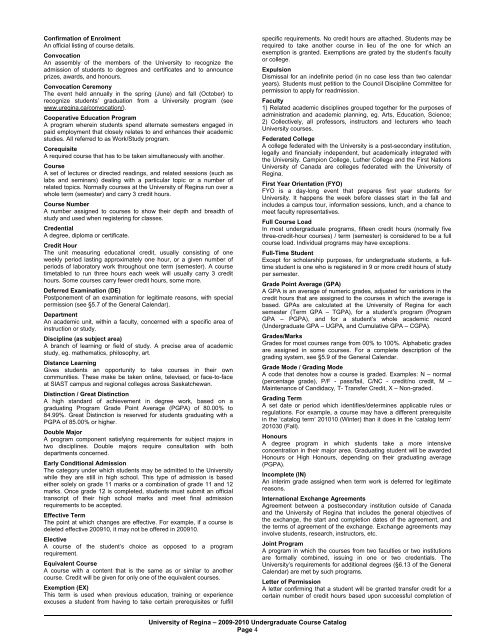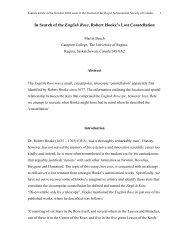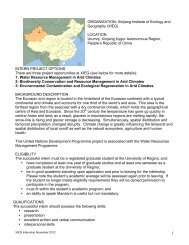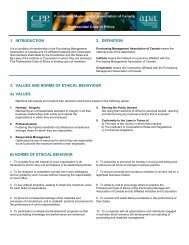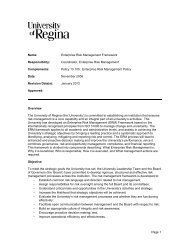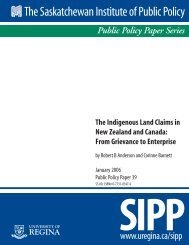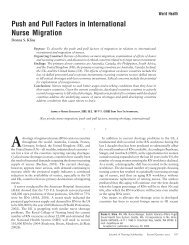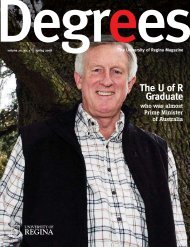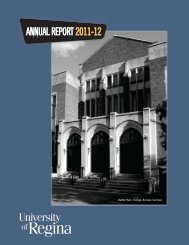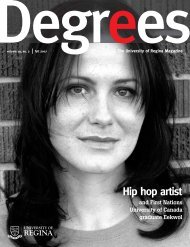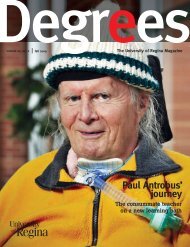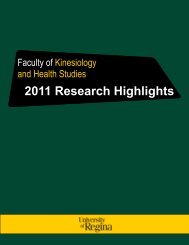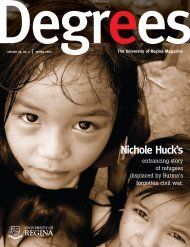2009-2010 Undergraduate Course Catalog - University of Regina
2009-2010 Undergraduate Course Catalog - University of Regina
2009-2010 Undergraduate Course Catalog - University of Regina
Create successful ePaper yourself
Turn your PDF publications into a flip-book with our unique Google optimized e-Paper software.
Confirmation <strong>of</strong> Enrolment<br />
An <strong>of</strong>ficial listing <strong>of</strong> course details.<br />
Convocation<br />
An assembly <strong>of</strong> the members <strong>of</strong> the <strong>University</strong> to recognize the<br />
admission <strong>of</strong> students to degrees and certificates and to announce<br />
prizes, awards, and honours.<br />
Convocation Ceremony<br />
The event held annually in the spring (June) and fall (October) to<br />
recognize students’ graduation from a <strong>University</strong> program (see<br />
www.uregina.ca/convocation/).<br />
Cooperative Education Program<br />
A program wherein students spend alternate semesters engaged in<br />
paid employment that closely relates to and enhances their academic<br />
studies. All referred to as Work/Study program.<br />
Corequisite<br />
A required course that has to be taken simultaneously with another.<br />
<strong>Course</strong><br />
A set <strong>of</strong> lectures or directed readings, and related sessions (such as<br />
labs and seminars) dealing with a particular topic or a number <strong>of</strong><br />
related topics. Normally courses at the <strong>University</strong> <strong>of</strong> <strong>Regina</strong> run over a<br />
whole term (semester) and carry 3 credit hours.<br />
<strong>Course</strong> Number<br />
A number assigned to courses to show their depth and breadth <strong>of</strong><br />
study and used when registering for classes.<br />
Credential<br />
A degree, diploma or certificate.<br />
Credit Hour<br />
The unit measuring educational credit, usually consisting <strong>of</strong> one<br />
weekly period lasting approximately one hour, or a given number <strong>of</strong><br />
periods <strong>of</strong> laboratory work throughout one term (semester). A course<br />
timetabled to run three hours each week will usually carry 3 credit<br />
hours. Some courses carry fewer credit hours, some more.<br />
Deferred Examination (DE)<br />
Postponement <strong>of</strong> an examination for legitimate reasons, with special<br />
permission (see §5.7 <strong>of</strong> the General Calendar).<br />
Department<br />
An academic unit, within a faculty, concerned with a specific area <strong>of</strong><br />
instruction or study.<br />
Discipline (as subject area)<br />
A branch <strong>of</strong> learning or field <strong>of</strong> study. A precise area <strong>of</strong> academic<br />
study, eg. mathematics, philosophy, art.<br />
Distance Learning<br />
Gives students an opportunity to take courses in their own<br />
communities. These make be taken online, televised, or face-to-face<br />
at SIAST campus and regional colleges across Saskatchewan.<br />
Distinction / Great Distinction<br />
A high standard <strong>of</strong> achievement in degree work, based on a<br />
graduating Program Grade Point Average (PGPA) <strong>of</strong> 80.00% to<br />
84.99%. Great Distinction is reserved for students graduating with a<br />
PGPA <strong>of</strong> 85.00% or higher.<br />
Double Major<br />
A program component satisfying requirements for subject majors in<br />
two disciplines. Double majors require consultation with both<br />
departments concerned.<br />
Early Conditional Admission<br />
The category under which students may be admitted to the <strong>University</strong><br />
while they are still in high school. This type <strong>of</strong> admission is based<br />
either solely on grade 11 marks or a combination <strong>of</strong> grade 11 and 12<br />
marks. Once grade 12 is completed, students must submit an <strong>of</strong>ficial<br />
transcript <strong>of</strong> their high school marks and meet final admission<br />
requirements to be accepted.<br />
Effective Term<br />
The point at which changes are effective. For example, if a course is<br />
deleted effective <strong>2009</strong>10, it may not be <strong>of</strong>fered in <strong>2009</strong>10.<br />
Elective<br />
A course <strong>of</strong> the student’s choice as opposed to a program<br />
requirement.<br />
Equivalent <strong>Course</strong><br />
A course with a content that is the same as or similar to another<br />
course. Credit will be given for only one <strong>of</strong> the equivalent courses.<br />
Exemption (EX)<br />
This term is used when previous education, training or experience<br />
excuses a student from having to take certain prerequisites or fulfill<br />
specific requirements. No credit hours are attached. Students may be<br />
required to take another course in lieu <strong>of</strong> the one for which an<br />
exemption is granted. Exemptions are grated by the student’s faculty<br />
or college.<br />
Expulsion<br />
Dismissal for an indefinite period (in no case less than two calendar<br />
years). Students must petition to the Council Discipline Committee for<br />
permission to apply for readmission.<br />
Faculty<br />
1) Related academic disciplines grouped together for the purposes <strong>of</strong><br />
administration and academic planning, eg. Arts, Education, Science;<br />
2) Collectively, all pr<strong>of</strong>essors, instructors and lecturers who teach<br />
<strong>University</strong> courses.<br />
Federated College<br />
A college federated with the <strong>University</strong> is a post-secondary institution,<br />
legally and financially independent, but academically integrated with<br />
the <strong>University</strong>. Campion College, Luther College and the First Nations<br />
<strong>University</strong> <strong>of</strong> Canada are colleges federated with the <strong>University</strong> <strong>of</strong><br />
<strong>Regina</strong>.<br />
First Year Orientation (FYO)<br />
FYO is a day-long event that prepares first year students for<br />
<strong>University</strong>. It happens the week before classes start in the fall and<br />
includes a campus tour, information sessions, lunch, and a chance to<br />
meet faculty representatives.<br />
Full <strong>Course</strong> Load<br />
In most undergraduate programs, fifteen credit hours (normally five<br />
three-credit-hour courses) / term (semester) is considered to be a full<br />
course load. Individual programs may have exceptions.<br />
Full-Time Student<br />
Except for scholarship purposes, for undergraduate students, a fulltime<br />
student is one who is registered in 9 or more credit hours <strong>of</strong> study<br />
per semester.<br />
Grade Point Average (GPA)<br />
A GPA is an average <strong>of</strong> numeric grades, adjusted for variations in the<br />
credit hours that are assigned to the courses in which the average is<br />
based. GPAs are calculated at the <strong>University</strong> <strong>of</strong> <strong>Regina</strong> for each<br />
semester (Term GPA – TGPA), for a student’s program (Program<br />
GPA – PGPA), and for a student’s whole academic record<br />
(<strong>Undergraduate</strong> GPA – UGPA, and Cumulative GPA – CGPA).<br />
Grades/Marks<br />
Grades for most courses range from 00% to 100%. Alphabetic grades<br />
are assigned in some courses. For a complete description <strong>of</strong> the<br />
grading system, see §5.9 <strong>of</strong> the General Calendar.<br />
Grade Mode / Grading Mode<br />
A code that denotes how a course is graded. Examples: N – normal<br />
(percentage grade), P/F - pass/fail, C/NC - credit/no credit, M –<br />
Maintenance <strong>of</strong> Candidacy, T- Transfer Credit, X – Non-graded.<br />
Grading Term<br />
A set date or period which identifies/determines applicable rules or<br />
regulations. For example, a course may have a different prerequisite<br />
in the ‘catalog term’ <strong>2010</strong>10 (Winter) than it does in the ‘catalog term’<br />
<strong>2010</strong>30 (Fall).<br />
Honours<br />
A degree program in which students take a more intensive<br />
concentration in their major area. Graduating student will be awarded<br />
Honours or High Honours, depending on their graduating average<br />
(PGPA).<br />
Incomplete (IN)<br />
An interim grade assigned when term work is deferred for legitimate<br />
reasons.<br />
International Exchange Agreements<br />
Agreement between a postsecondary institution outside <strong>of</strong> Canada<br />
and the <strong>University</strong> <strong>of</strong> <strong>Regina</strong> that includes the general objectives <strong>of</strong><br />
the exchange, the start and completion dates <strong>of</strong> the agreement, and<br />
the terms <strong>of</strong> agreement <strong>of</strong> the exchange. Exchange agreements may<br />
involve students, research, instructors, etc.<br />
Joint Program<br />
A program in which the courses from two faculties or two institutions<br />
are formally combined, issuing in one or two credentials. The<br />
<strong>University</strong>’s requirements for additional degrees (§6.13 <strong>of</strong> the General<br />
Calendar) are met by such programs.<br />
Letter <strong>of</strong> Permission<br />
A letter confirming that a student will be granted transfer credit for a<br />
certain number <strong>of</strong> credit hours based upon successful completion <strong>of</strong><br />
<strong>University</strong> <strong>of</strong> <strong>Regina</strong> – <strong>2009</strong>-<strong>2010</strong> <strong>Undergraduate</strong> <strong>Course</strong> <strong>Catalog</strong><br />
Page 4


